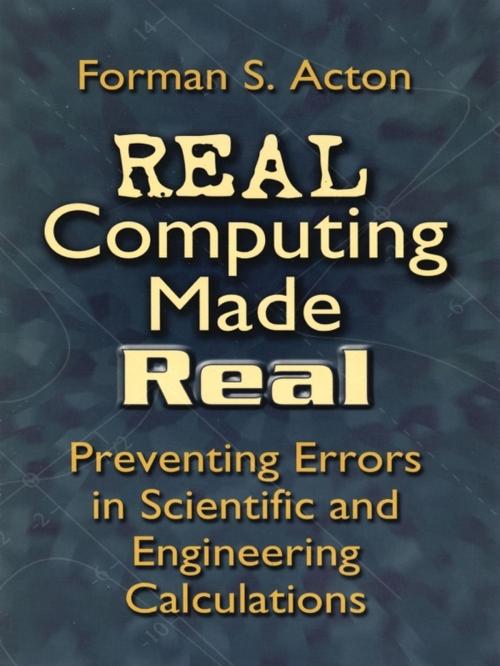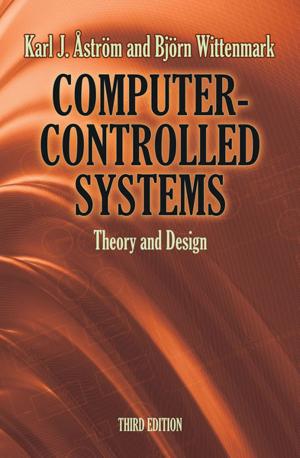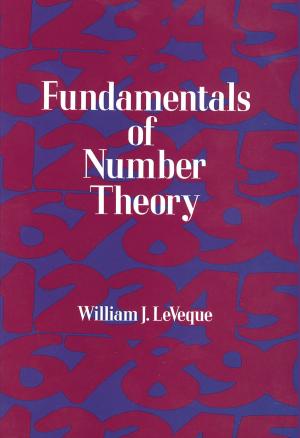Real Computing Made Real
Preventing Errors in Scientific and Engineering Calculations
Nonfiction, Science & Nature, Mathematics, Discrete Mathematics, Computers, General Computing, Skills| Author: | Forman S. Acton | ISBN: | 9780486152936 |
| Publisher: | Dover Publications | Publication: | January 18, 2013 |
| Imprint: | Dover Publications | Language: | English |
| Author: | Forman S. Acton |
| ISBN: | 9780486152936 |
| Publisher: | Dover Publications |
| Publication: | January 18, 2013 |
| Imprint: | Dover Publications |
| Language: | English |
Engineers and scientists who want to avoid insidious errors in their computer-assisted calculations will welcome this concise guide to trouble-shooting. Real Computing Made Real offers practical advice on detecting and removing bugs. It also outlines techniques for preserving significant figures, avoiding extraneous solutions, and finding efficient iterative processes for solving nonlinear equations.
Those who compute with real numbers (for example, floating-point numbers stored with limited precision) tend to develop techniques that increase the frequency of useful answers. But although there might be ample guidance for those addressing linear problems, little help awaits those negotiating the nonlinear world. This book, geared toward upper-level undergraduates and graduate students, helps rectify that imbalance. Its examples and exercises (with answers) help readers develop problem-formulating skills and assist them in avoiding the common pitfalls that software packages seldom detect. Some experience with standard numerical methods is assumed, but beginners will find this volume a highly practical introduction, particularly in its treatment of often-overlooked topics.
Those who compute with real numbers (for example, floating-point numbers stored with limited precision) tend to develop techniques that increase the frequency of useful answers. But although there might be ample guidance for those addressing linear problems, little help awaits those negotiating the nonlinear world. This book, geared toward upper-level undergraduates and graduate students, helps rectify that imbalance. Its examples and exercises (with answers) help readers develop problem-formulating skills and assist them in avoiding the common pitfalls that software packages seldom detect. Some experience with standard numerical methods is assumed, but beginners will find this volume a highly practical introduction, particularly in its treatment of often-overlooked topics.
Engineers and scientists who want to avoid insidious errors in their computer-assisted calculations will welcome this concise guide to trouble-shooting. Real Computing Made Real offers practical advice on detecting and removing bugs. It also outlines techniques for preserving significant figures, avoiding extraneous solutions, and finding efficient iterative processes for solving nonlinear equations.
Those who compute with real numbers (for example, floating-point numbers stored with limited precision) tend to develop techniques that increase the frequency of useful answers. But although there might be ample guidance for those addressing linear problems, little help awaits those negotiating the nonlinear world. This book, geared toward upper-level undergraduates and graduate students, helps rectify that imbalance. Its examples and exercises (with answers) help readers develop problem-formulating skills and assist them in avoiding the common pitfalls that software packages seldom detect. Some experience with standard numerical methods is assumed, but beginners will find this volume a highly practical introduction, particularly in its treatment of often-overlooked topics.
Those who compute with real numbers (for example, floating-point numbers stored with limited precision) tend to develop techniques that increase the frequency of useful answers. But although there might be ample guidance for those addressing linear problems, little help awaits those negotiating the nonlinear world. This book, geared toward upper-level undergraduates and graduate students, helps rectify that imbalance. Its examples and exercises (with answers) help readers develop problem-formulating skills and assist them in avoiding the common pitfalls that software packages seldom detect. Some experience with standard numerical methods is assumed, but beginners will find this volume a highly practical introduction, particularly in its treatment of often-overlooked topics.















